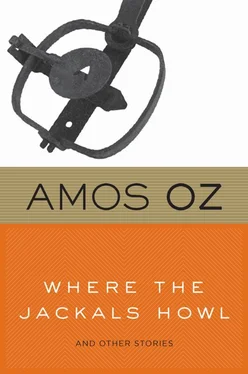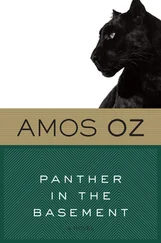Amos Oz - Where the Jackals Howl
Здесь есть возможность читать онлайн «Amos Oz - Where the Jackals Howl» весь текст электронной книги совершенно бесплатно (целиком полную версию без сокращений). В некоторых случаях можно слушать аудио, скачать через торрент в формате fb2 и присутствует краткое содержание. Год выпуска: 2012, Издательство: Houghton Mifflin Harcourt, Жанр: Современная проза, на английском языке. Описание произведения, (предисловие) а так же отзывы посетителей доступны на портале библиотеки ЛибКат.
- Название:Where the Jackals Howl
- Автор:
- Издательство:Houghton Mifflin Harcourt
- Жанр:
- Год:2012
- ISBN:нет данных
- Рейтинг книги:4 / 5. Голосов: 1
-
Избранное:Добавить в избранное
- Отзывы:
-
Ваша оценка:
- 80
- 1
- 2
- 3
- 4
- 5
Where the Jackals Howl: краткое содержание, описание и аннотация
Предлагаем к чтению аннотацию, описание, краткое содержание или предисловие (зависит от того, что написал сам автор книги «Where the Jackals Howl»). Если вы не нашли необходимую информацию о книге — напишите в комментариях, мы постараемся отыскать её.
Where the Jackals Howl — читать онлайн бесплатно полную книгу (весь текст) целиком
Ниже представлен текст книги, разбитый по страницам. Система сохранения места последней прочитанной страницы, позволяет с удобством читать онлайн бесплатно книгу «Where the Jackals Howl», без необходимости каждый раз заново искать на чём Вы остановились. Поставьте закладку, и сможете в любой момент перейти на страницу, на которой закончили чтение.
Интервал:
Закладка:
Toward evening, Etkin went around from room to room and invited the committee to an urgent meeting at eight-thirty. When he came to Geula, he told her about the young men’s ideas and the undemocratic pressure to which he was being subjected, and asked her to bring along to the meeting a pot of black coffee and a lot of good will. Geula responded with an acid smile. Her eyes were bleary because Etkin had awakened her from a troubled sleep. As she changed her clothes, the night fell, damp and hot and close.
3
DAMP AND close and hot the night fell on the kibbutz, tangled in the dust-laden cypresses, oppressed the lawns and ornamental shrubs. Sprinklers scattered water onto the thirsty lawn, but it was swallowed up at once: perhaps it evaporated even before it touched the grass. An irritable phone rang vainly in the locked office. The walls of the houses gave out a damp vapor. From the kitchen chimney a stiff column of smoke rose like an arrow into the heart of the sky, because there was no breeze. From the greasy sinks came a shout. A dish had been broken and somebody was bleeding. A fat house-cat had killed a lizard or a snake and dragged its prey onto the baking concrete path to toy with it lazily in the dense evening sunlight. An ancient tractor started to rumble in one of the sheds, choked, belched a stench of oil, roared, spluttered, and finally managed to set out to deliver an evening meal to the second shift, who were toiling in an outlying field. Near the Persian lilac Geula saw a bottle dirty with the remains of a greasy liquid. She kicked at it repeatedly, but instead of shattering, the bottle rolled heavily among the rosebushes. She picked up a big stone. She tried to hit the bottle. She longed to smash it. The stone missed. The girl began to whistle a vague tune.
Geula was a short, energetic girl of twenty-nine or so. Although she had not yet found a husband, none of us would deny her good qualities, such as the dedication she lavished on local social and cultural activities. Her face was pale and thin. No one could rival her in brewing strong coffee — coffee to raise the dead, we called it. A pair of bitter lines were etched at the corners of her mouth.
On summer evenings, when the rest of us would lounge in a group on a rug spread on one of the lawns and launch jokes and bursts of cheerful song heavenward, accompanied by clouds of cigarette smoke, Geula would shut herself up in her room and not join us until she had prepared the pot of scalding, strong coffee. She it was, too, who always took pains to ensure that there was no shortage of biscuits.
What had passed between Geula and me is not relevant here, and I shall make do with a hint or two. Long ago we used to stroll together to the orchards in the evening and talk. It was all a long time ago, and it is a long time since it ended. We would exchange unconventional political ideas or argue about the latest books. Geula was a stern and sometimes merciless critic: I was covered in confusion. She did not like my stories, because of the extreme polarity of situations, scenery, and characters, with no intermediate shades between black and white. I would utter an apology or a denial, but Geula always had ready proofs and she was a very methodical thinker. Sometimes I would dare to rest a conciliatory hand on her neck, and wait for her to calm down. But she never relaxed completely. If once or twice she leaned against me, she always blamed her broken sandal or her aching head. And so we drifted apart. To this day she still cuts my stories out of the periodicals, and arranges them in a cardboard box kept in a special drawer devoted to them alone.
I always buy her a new book of poems for her birthday. I creep into her room when she is out and leave the book on her table, without any inscription or dedication. Sometimes we happen to sit together in the dining hall. I avoid her glance, so as not to have to face her mocking sadness. On hot days, when faces are covered in sweat, the acne on her cheeks reddens and she seems to have no hope. When the cool of autumn comes, I sometimes find her pretty and attractive from a distance. On such days Geula likes to walk to the orchards in the early evening. She goes alone and comes back alone. Some of the youngsters come and ask me what she is looking for there, and they have a malicious snicker on their faces. I tell them that I don’t know. And I really don’t.
4
VICIOUSLY GEULA picked up another stone to hurl at the bottle. This time she did not miss, but she still failed to hear the shattering sound she craved. The stone grazed the bottle, which tinkled faintly and disappeared under one of the bushes. A third stone, bigger and heavier than the other two, was launched from ridiculously close range: the girl trampled on the loose soil of the flower bed and stood right over the bottle. This time there was a harsh, dry explosion, which brought no relief. Must get out.
Damp and close and hot the night fell, its heat pricking the skin like broken glass. Geula retraced her steps, passed the balcony of her room, tossed her sandals inside, and walked down barefoot onto the dirt path.
The clods of earth tickled the soles of her feet. There was a rough friction, and her nerve endings quivered with flickers of vague excitement. Beyond the rocky hill the shadows were waiting for her: the orchard in the last of the light. With determined hands she widened the gap in the fence and slipped through. At that moment a slight evening breeze began to stir. It was a warmish summer breeze with no definite direction. An old sun rolled westward, trying to be sucked up by the dusty horizon. A last tractor climbed back to the depot, panting along the dirt road from the outlying plots. No doubt it was the tractor that had taken the second-shift workers their supper. It seemed shrouded in smoke or summer haze.
Geula bent down and picked some pebbles out of the dust. Absently she began to throw them back again, one by one. There were lines of poetry on her lips, some by the young poets she was fond of, others her own. By the irrigation pipe she paused, bent down, and drank as though kissing the faucet. But the faucet was rusty, the pipe was still hot, and the water was tepid and foul. Nevertheless she bent her head and let the water pour over her face and neck and into her shirt. A sharp taste of rust and wet dust filled her throat. She closed her eyes and stood in silence. No relief. Perhaps a cup of coffee. But only after the orchard. Must go now.
5
THE ORCHARDS were heavily laden and fragrant. The branches intertwined, converging above the rows of trunks to form a shadowy dome. Underfoot the irrigated soil retained a hidden dampness. Shadows upon shadows at the foot of those gnarled trunks. Geula picked a plum, sniffed and crushed it. Sticky juice dripped from it. The sight made her feel dizzy. And the smell. She crushed a second plum. She picked another and rubbed it on her cheek till she was spattered with juice. Then, on her knees, she picked up a dry stick and scratched shapes in the dust. Aimless lines and curves. Sharp angles. Domes. A distant bleating invaded the orchard. Dimly she became aware of a sound of bells. She was far away. The nomad stopped behind Geula’s back, as silent as a phantom. He dug at the dust with his big toe, and his shadow fell in front of him. But the girl was blinded by a flood of sounds. She saw and heard nothing. For a long time she continued to kneel on the ground and draw shapes in the dust with her twig. The nomad waited patiently in total silence. From time to time he closed his good eye and stared ahead of him with the other, the blind one. Finally he reached out and bestowed a long caress on the air. His obedient shadow moved in the dust. Geula stared, leapt to her feet, and leaned against the nearest tree, letting out a low sound. The nomad let his shoulders drop and put on a faint smile. Geula raised her arm and stabbed the air with her twig. The nomad continued to smile. His gaze dropped to her bare feet. His voice was hushed, and the Hebrew he spoke exuded a rare gentleness:
Читать дальшеИнтервал:
Закладка:
Похожие книги на «Where the Jackals Howl»
Представляем Вашему вниманию похожие книги на «Where the Jackals Howl» списком для выбора. Мы отобрали схожую по названию и смыслу литературу в надежде предоставить читателям больше вариантов отыскать новые, интересные, ещё непрочитанные произведения.
Обсуждение, отзывы о книге «Where the Jackals Howl» и просто собственные мнения читателей. Оставьте ваши комментарии, напишите, что Вы думаете о произведении, его смысле или главных героях. Укажите что конкретно понравилось, а что нет, и почему Вы так считаете.












